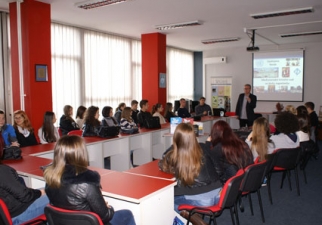Following last month’s “train-the-trainers” workshop, which was organised for high school teachers in Tuzla, Bosnia and Herzegovina as part of the Tribunal’s Youth Outreach Project, the five participants put their newfound skills to use last week. The workshop had equipped the participating teachers to give presentations about work of the ICTY. Between 13 and 18 May, they gave lectures to students at their respective schools, each of them taking a unique approach to conveying how trials are conducted at the Tribunal. ICTY Registry Liaison Officer Almir Alić travelled to Tuzla to attend the discussions.
At Tuzla’s Medical School, human rights and democracy teacher Amir Ahmetović empowered more than 30 students to do their own research. He tasked them with finding information about the work of the Tribunal and had them prepare presentations on specific topics related to its achievements. On 13 May, under Mr Ahmetović’s supervision small groups of students presented their findings to the larger group, after which the audience chimed in with questions for the presenters and the teacher.
Three days later, on 16 May, 42 students and three teachers at “Meša Selimović” Gymnasium attended a talk by the school’s philosophy teacher, Nijaz Salimović. Addressing students enrolled in an elective history course, Mr Salimović discussed the crimes committed throughout the territory of the former Yugoslavia and spoke of the tragic events as a lesson in the importance of protecting human rights and abiding by international humanitarian law. "Who should talk about these issues if not us?” said Salimović, “and if not now, then when?"
History teacher Nedžad Aljić made a similar appeal to his class at “Ismet Mujezinović” Gymnasium. As the standard history curriculum of the school does not include any material on the war in the former Yugoslavia, Mr Aljić’s lecture on 17 May was particularly important. The 13 participants showed great interest in various aspects of trials before the ICTY, and the teacher announced that he would organise the same presentation for students in other classes in their school.
The next day, law teacher Almedina Avdić gave a talk on the ICTY to 24 students of the High School of Economics and Trade in Tuzla. The school’s principal also attended. In her presentation, Ms Avdić meticulously analysed the ample information materials that the Tribunal’s Outreach representative had shared with the teachers during the training in April. She expressed hope that next year the Tribunal’s Outreach Programme would organise a series of guest lectures in her school on specific topics related to the work of the Tribunal.
Like her fellow teacher at the medical school, Senada Čičkušić-Šahović, an instructor at the Combined School of Construction and Geodesy, took a more hands-on approach. At her workshop on 18 May, 29 students worked in groups to discuss their understanding of the definitions of crimes under the Tribunal’s jurisdiction, then shared their thoughts with their fellow students. During the discussion that followed, Ms Čičkušić-Šahović clarified and elaborated on definitions, while the students actively posed questions and shared comments. At the end of the presentation, student Belma Avdihodžić read her essay on justice, which received a hearty round of applause.
All teachers were awarded certificates for their participation in the ICTY Youth Outreach Project. The instructors, in turn, affirmed the importance of this kind of continuing education, especially in enabling teachers to pass knowledge on to students. To that end, each teacher committed to incorporating the lessons they had prepared as part of the workshop into their regular class activities.


